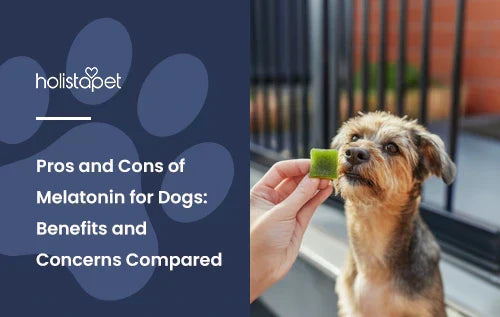Can dogs have melatonin gummies? You'll want to triple-check the label before sharing.
Many of our favorite gummies carry extras that dogs' bodies simply don't take well. Even small amounts of certain ingredients can cause them big trouble, so gummies are not something to hand over without care.
But there are pet-specific melatonin options that give the same calming effects without the ingredient roulette. They're made for canine needs, use safe ingredients, and make dosing super simple. That's good news for your restless four-legged friend.
Understanding Melatonin for Dogs

Melatonin is a naturally occurring hormone from the pineal gland in the brain that manages sleep-wake cycles. In dogs, it can support relaxation and help ease occasional nervous behaviors.
Veterinarians often suggest melatonin for loud noises, seasonal flank alopecia, or sleep problems, especially in older dogs. With the right dosage, this tiny but mighty hormone works as a straightforward way to help your companion animal chill out.
What Type of Melatonin Can Dogs Take?
Dogs should only take melatonin supplements made specifically for them. These are free from harmful extras like xylitol or added sugars found in some human products. Pet-specific formulas also make dosing easier and safer. Choosing the right product means your pup gets the sleep benefits without risks.
Differences Between Pet-Specific and Human Melatonin
Pet-specific melatonin skips risky extras like artificial sweeteners, dyes, and unnecessary fillers. It's designed with a dog's body in mind, making it easier to give the correct amount.
Human melatonin can contain ingredients that are harmless to us but toxic to pets. That's why picking a dog-friendly formula is crucial to keeping things safe and predictable for your pooch.
Why Dosage and Ingredients Matter
Choosing the right formula and sticking to the recommended dosage helps your pup receive melatonin's cool perks without the unnecessary risks. Generally, how much melatonin you should give your dog depends on their weight, age, and overall health. Going overboard can cause intense sleepiness or other potential side effects.
Ingredients also matter. Avoid products with xylitol, artificial colors, or added sugars to prevent unwanted results.
Why Melatonin Gummies Could Be Bad for Dogs
Melatonin gummies for humans often contain ingredients that aren't safe for dogs, such as synthetic sweeteners, extra sugar, and flavor additives. On top of that, the dosage in those gummies is usually too high for most pets. Sticking with dog-formulated melatonin keeps things safer and easier to manage.
Hidden Ingredients That Could Be Harmful
Some gummies include xylitol, which is toxic to dogs even in tiny amounts. Added sugars, on the other hand, can lead to weight gain. Meanwhile, artificial colors bring no upside and may just upset your pup's system.
Always read the label before giving any supplement. Be careful to avoid those that contain anything beyond melatonin and safe flavoring.
Overdose Risks From Human Dosages
Too much melatonin in human products can cause intense sleepiness, stomach troubles, or changes in blood pressure in our canine friends. They are more sensitive to dosage shifts, so even a small extra amount can throw things off. Using a pet-specific formula makes it easier to measure and avoid accidental overdosing.
Digestive Discomfort and Other Side Effects
Dogs that take melatonin gummies for people may experience queasiness, loose stools, or loss of appetite. Some may also show unusual tiredness or restlessness. These side effects often come from extra ingredients or incorrect dosages. Stick to a vet-approved, pet-specific melatonin product to help reduce the chance of upsetting your dog's system.
Safer Alternatives to Human Melatonin Gummies
Give your dog melatonin without the risky extras by choosing pet-formulated chews or tablets. These pup-approved products are specifically made for canine needs, with safe ingredients and clear dosing guidelines.
You can also find calming blends that combine melatonin with other natural ingredients to support calm and relaxation. Overall, they're a safer, smarter choice than gummies for people.
Vet-Formulated Melatonin Products
Vet-formulated melatonin comes in safe doses with dog-friendly components. Our Melatonin Soft Chews, for example, feature all-natural ingredients like L-theanine, chamomile, passion flower, ashwagandha, and valerian root. They help reduce anxiousness, promote relaxation, and support better sleep. Each bag has 30 tasty chews, making it easy to give your pup calm, restful nights without the fluff.
Natural Calming Supplements for Dogs
Some dogs could use a broader calming approach. For example, there's our CBD Calming Chews and CBD Dog Treats for Anxiety. These hit products feature broad-spectrum CBD to promote relaxation and help ease discomfort. They're made with natural ingredients, taste great, and are easy to give. For many pet owners, these options work well alongside a healthy routine.
How to Safely Give Melatonin to Dogs
The right melatonin dosage depends on your dog's weight and size. Smaller pups need less, while larger breeds can handle more. You can consult our Melatonin Dosage Guide for safe amounts and timing.
Most dogs take melatonin once or twice daily, ideally at the same times to keep their sleep-wake cycles steady. Some take them before an anticipated stressful event to help them cope. Either way, you should speak to your veterinarian regarding the best approach.
Signs Your Dog May Benefit from Melatonin
Some canines show clear signs that melatonin could help them. If you're not sure what to watch for, here are some clues:
- Sleep Issues or Nighttime Restlessness. Difficulty settling or frequent waking at night calls for a natural sleep aid like melatonin.
- Occasional Nervousness. Anxious behaviors during storms, fireworks, or travel.
- Seasonal Discomfort. Issues like hair loss due to seasonal flank alopecia.
- Cognitive Dysfunction in Older Dogs. Confusion or pacing after dark.
Can Melatonin Be Combined With Other Supplements?
Yes, melatonin can work with certain supplements like probiotics or omega-3s. This combo may support overall wellness while helping with sleep and relaxation.
Fun fact: HolistaPet's Probiotic Soft Chews for Dogs contain 9 beneficial bacteria strains, plus sweet potato and pumpkin. They help restore digestive balance and keep your furry friend feeling good from the inside out.
What to Avoid Mixing With Melatonin
Avoid giving melatonin along with medications or supplements that cause drowsiness unless your veterinarian approves. Combining them can raise melatonin levels too high, causing excessive sleepiness or affecting coordination. When in doubt, check with your vet before adding anything new to your dog's wellness routine.
Featured Product: HolistaPet Melatonin Chews for Dogs

Our Melatonin Soft Chews, specially crafted for canine pets, feature all-natural ingredients and no artificial fillers. Each chew blends melatonin with calming herbs like L-theanine, chamomile, passion flower, lemon balm, and valerian root.
They're easy to dose and tasty. Plus, they help your pup relax as they support better sleep. Every bag comes with 30 chews your furry sidekick will love. You can't go wrong!
When To Talk to Your Vet About Melatonin Use
Reach out to your veterinarian before starting melatonin. This is especially important if your pup takes other medications, has ongoing health issues, or is pregnant.
A vet can confirm safe dosages for your pet and check for possible medicine interactions. This step keeps your pup's wellness plan tailored to their needs while avoiding unwanted side effects or big complications.
Pre-Existing Conditions That May Require Caution
Dogs with autoimmune disorders, hormonal imbalances, or heart problems may need extra care with melatonin. Certain conditions can change how their body reacts to the supplement. Always share your dog's full health history with your vet, so they can decide if melatonin is the right choice for your pooch.
Monitoring Your Dog's Response
After starting melatonin supplementation, watch for changes in energy, appetite, or behavior. Positive signs include calmer evenings and better sleep. If you notice excessive sleepiness, stomach troubles, or anything unusual, stop giving the melatonin product and contact your vet.
FAQs – Melatonin Gummies and Dogs
Melatonin for dogs raises plenty of questions, especially if you're used to human supplements only. Knowing what's safe, what to avoid, and how to dose properly can work wonders for your furry buddy. These quick answers cover the most common concerns, so you can make informed choices for your pup's welfare.
Can dogs have human melatonin gummies in small amounts?
Small amounts might seem harmless, but human gummies can contain xylitol, added sugars, or other risky ingredients. It's safer to skip these gummies entirely and choose a pet-formulated melatonin product instead.
How fast does melatonin work for dogs?
Melatonin usually starts working within 30 minutes to an hour. You may notice your dog becoming calmer or more settled as it takes effect. Giving it at the right time—like before bed or a known stressful event— supports your dog's sleep and relaxation when they need it most.
Are sugar-free melatonin gummies safe for pets?
Not always. Many sugar-free gummies contain xylitol, which is toxic to dogs even in small amounts. Other artificial sweeteners can also cause stomach troubles. If you want to avoid potentially harmful effects, choose pet-specific melatonin products only.
Can puppies take melatonin?
Puppies can take melatonin only under a vet's guidance. Their bodies are still developing, and dosage needs are much lower than for adult dogs. A vet can confirm if it's safe and recommend the right amount. They can make sure the supplement won't interfere with your puppy's growth and training.
Is daily melatonin safe to give to dogs?
Daily melatonin can be generally safe for dogs if given in the right dosage and approved by a vet. Long-term use requires constant monitoring to watch for side effects or changes in behavior. Regular check-ins with your veterinarian are a must.
Final Thoughts – Can Dogs Eat Melatonin Gummies
Melatonin can support better rest for dogs, but human gummies often bring risks. The extra ingredients and high doses can cause problems. Even if the label looks harmless, there's always a chance something inside isn't safe for your pup. Don't take that risk.
Pet-specific options, like our bestselling Melatonin Soft Chews, keep things safe, tasty, and easy to measure. With your vet's guidance and our trusted formula, you can give your cherished companion calm, restful nights without worrying about hidden hazards.







![Probiotics For Dogs [Soft Chews] - HolistaPet](http://www.holistapet.com/cdn/shop/files/Probiotic-Infographic-1_472d7a29-e30c-435a-9638-1365d8c3a9f9.jpg?v=1725384841&width=104)
















 Broad Spectrum CBD Oil for Dogs - Fast Acting
Broad Spectrum CBD Oil for Dogs - Fast Acting
 Chicken Flavored CBD Oil For Dogs - Easy Dose
Chicken Flavored CBD Oil For Dogs - Easy Dose
 Salmon Flavored CBD Oil For Dogs - Highly Rated
Salmon Flavored CBD Oil For Dogs - Highly Rated
 CBD Dog Treats for Anxiety - Loved by Thousands
CBD Dog Treats for Anxiety - Loved by Thousands





Leave a comment
All comments are moderated before being published.
This site is protected by hCaptcha and the hCaptcha Privacy Policy and Terms of Service apply.